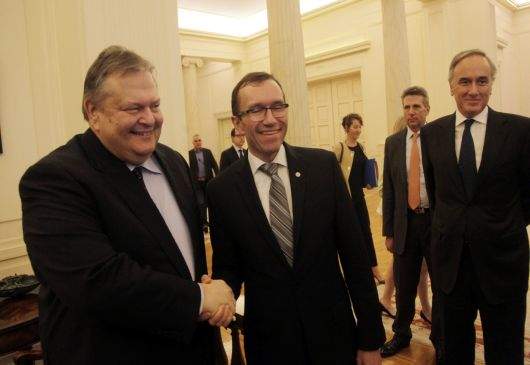 E. VENIZELOS: Mr. Espen Barth Eide and I had a long and very substantial discussion about the situation that has taken shape in Cyprus, following the latest provocative actions on the part of Turkey, which openly questions the sovereign rights and even the very existence of the Republic of Cyprus.
E. VENIZELOS: Mr. Espen Barth Eide and I had a long and very substantial discussion about the situation that has taken shape in Cyprus, following the latest provocative actions on the part of Turkey, which openly questions the sovereign rights and even the very existence of the Republic of Cyprus.
Of course, Mr. Eide, an experienced politician who also has the Norwegian experience with regard to the exploitation of hydrocarbons, has a very specific mission, which we support: To achieve a return to the negotiations between the leaders of the two communities, within the framework of what was agreed upon in February 2014.
That is what we want. But in order for that to happen, there cannot be affronts or distractions. There are ways to return to the talks. What are needed, however, are initiatives that first must be taken by those who are responsible for the crisis that has been created.
Our role is always that of supporting the decisions and initiatives of the President of the Republic of Cyprus and the leader of the Greek Cypriot community. Our criterion is always international legality. Our criterion is also the memory and knowledge of a harsh historical experience. But our stance is always a stance aimed at ensuring stability and peace, as well, naturally, as a solution to the Cyprus issue that is just, viable and in accordance with the resolutions of the Security Council, the European acquis, and, naturally, the fundamental values that govern every federal state.
JOURNALIST: Mr. Minister, does the departure of the Barbaros from the Cypriot EEZ remain a condition for starting the talks again?
E. VENIZELOS: The presence of the Barbaros and its activities constitute and affront to international law. We are talking here about a process of the United Nations, which is the institution preeminently serving international law.
November 5, 2014


